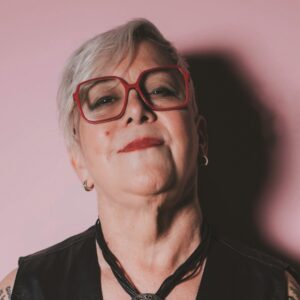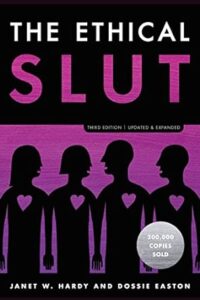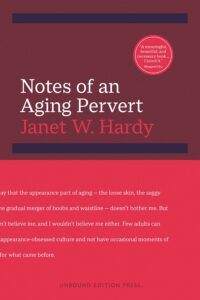By a strange twist of fate, the Provincetown Book Festival, hosted by the public library and running Sept. 29 to Oct. 1 this year, always seems to happen the same week as Mates Leather Weekend, a five-day romp through town of leather, kink, and fetish enthusiasts. For one of this year’s book festival participants, the coincidence might seem especially fitting.

“If you met me, you wouldn’t see me as a transgressive or radical person,” says Janet W. Hardy, the well-known kink enthusiast and polyamory apologist. “I look like someone’s mom. Except when I’m done up in leather, in which case I look like someone’s mom done up in leather.”
Hardy is looking forward to her first visit to the tip of the Cape: “I like being in places with lots of queer people,” she says. “It’s nice to be places where I don’t have to spend a lot of time explaining myself.”
She’ll be in conversation with author and trans activist Oliver Radclyffe in an event on Oct. 1 titled “Transgressive: Radical Approaches to Gender and Sex.” Words like “transgressive” and “radical” seem to follow Hardy wherever she goes, a reputation she says she readily accepts, especially as time goes by. “I actually think I’m more transgressive as I get older,” she says. “I’m not quite as wedded to the party line about kink or about queerness or about gender.”
Most will know Hardy for her 1997 book coauthored with Dossie Easton, The Ethical Slut: A Practical Guide to Polyamory, Open Relationships, and Other Freedoms in Sex and Love. The landmark work has sold over 200,000 copies in three editions and has been translated into five languages. It’s considered a classic in the relationship self-help category and has made Hardy a standard-bearer for the queer and sex-positive.

As far as she knows, Hardy’s books have not been banned anywhere. But her talk will occur on the first day of Banned Books Week — a nationwide effort launched in 1982 by the American Library Association with a coalition of others defending intellectual freedom.
She calls the current wave of book banning “reprehensible” and says she lives by the motto she learned as a child: “If you’re old enough to want to read it, you’re old enough to know what’s inside it.”
She doesn’t believe it’s possible to influence anyone’s sexuality. “If it were possible for parenting to turn a child gay, then I would have the queerest kids in the universe,” she says. “But somehow, they both turned out straight. Go figure.”
Hardy’s appearance coincides with the release of her new book, Notes of an Aging Pervert, a memoir about growing older as a queer adult, from Unbound Edition Press.

She intended this book, her third memoir, intending it to be cowritten with one of her children on the subject of generational inheritance. “But I kept finding myself writing about aging,” she says. “Eventually, I threw up my hands and said, ‘Okay, my brain wants me to write about aging.’ ”
As one might guess, sex is one of the aspects of aging she’s found most interesting. “There’s been a big movement in the last decade to talk about sexuality among older people,” Hardy says. And it’s not a bad thing that the medical community and media are acknowledging that older people still have mental, spiritual, and sexual needs, Hardy says. Humans, especially older ones, she says, “need intimacy, affection, and touch.”
But, Hardy says, “We’re not giving much recognition to the fact that some older people don’t want to be sexually active.” Libidos change, she says, and sex might not be the path to intimacy for everyone. She is on the waiting list for a continuing care community, for example, because she hopes it will ensure that both she and her partner can, when they need it, be part of a nurturing collective.
Then there are the realities of queer aging, in which the “elevator promise,” as Hardy calls it, of heteronormative love — dating, living together, marriage, kids — is not necessarily fulfilled. What’s exciting about that, she says, is that queers have the opportunity to pioneer new kinds of family structures, “ones formed on bases other than romantic love — like, for example, best friends who set up house together and raise each other’s kids.”
Writing this book, Hardy found inspiration in works by Barbara Ehrenreich, Abigail Thomas, Elizabeth Strout, Larry McMurtry, and Anne Tyler, all of whom have explored aging and dying in their work.
In the course of her meditations on aging, Hardy has also come to feel a peculiar kinship with the character Billy Pilgrim in Kurt Vonnegut’s Slaughterhouse-Five, who becomes “unstuck in time” and travels unpredictably and wildly through his life.
During her years as a BDSM practitioner, Hardy says, she had some experiences that suggested what may happen when she’s “no longer stuck in space and time.” She has written about ways in which intense sexual experiences can be on a par with spiritual transcendence. And she says she believes death will be a similar loosening of the shackles of the body.
Reflections on that are the beating heart of her latest book. Her “weird, kinky” years were fun, she says. “But what I value more is the wisdom I acquired in the process.”
Transgression
The event: Janet W. Hardy and Oliver Radclyffe on radical approaches to gender and sex
The time: Sunday, Oct. 1, 9:30 a.m.
The place: Provincetown Public Library, 356 Commercial St.
The cost: Free; see provincetownbookfestival.org



